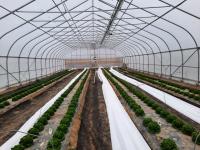About
 The goal of the ASD Easy project is to contribute to the long-term profitability and sustainability of organic specialty crop production systems by developing optimal ways to use Anaerobic Soil Disinfestation (ASD) to manage soilborne diseases and preserve soil health.
The goal of the ASD Easy project is to contribute to the long-term profitability and sustainability of organic specialty crop production systems by developing optimal ways to use Anaerobic Soil Disinfestation (ASD) to manage soilborne diseases and preserve soil health.
Soilborne pests and pathogens are major factors causing yield loss in organic production, and developing new, effective strategies against diseases, nematodes, and weeds is a critical need for organic specialty crop producers. The lack of management options is particularly critical in regions characterized by warm and humid conditions and high pest/pathogen pressure, as is the case in Florida, or in areas like the Mid-Atlantic region characterized by many small-size farms and increasing adoption of protected cultivation systems, such as high tunnels, that favor intensification of cropping systems and the development of microenvironmental conditions that can lead to soil health problems.
ASD is a soil treatment, which is applied 3-4 weeks before planting specialty crops in the field or in high tunnels. The procedure consists of:
- incorporating organic amendments containing high amounts of labile carbon
- covering the soil with any impermeable film that limits gas exchange
- irrigating the soil to field capacity.
The combination of these three components leads to a rapid increase of soil microbial populations with a consequent depletion of oxygen and a temporary shift from aerobic to anaerobic conditions. Anaerobic microorganisms which degenerate the carbon develop organic compounds which suppress plant diseases. ASD is a very flexible method that can be implemented by growers at any scale using various sources of carbon available on farm or locally; however, further research is needed to refine and adapt ASD to different climates and growing conditions.
Funded by a grant from the USDA NIFA Organic Research and Extension Initiative, this 4-year project will include on-farm trials with the goal of optimizing ASD in organic vegetable and strawberry production in Florida and Pennsylvania, two states that are representative of the Northeast and Southeast regions. Our multidisciplinary research team will measure the impact of ASD on soil health and on specific soilborne pests and diseases. The project has the following objectives:
- Optimize and evaluate opportunities for integrating ASD in organic specialty crop systems as a biological method to enhance soil health across the U.S. Northeast and Southeast regions.
- Assess the short- and long-term impact of ASD on soil ecology and microbiome dynamics in organic specialty crop systems, and examining any effects on nutrient dynamics, soilborne pests and pathogens, and overall soil health.
- Assess the efficacy of ASD as a system-based integrated management tool to address soilborne plant pathogens, plant-parasitic nematodes, and weeds affecting organic specialty crop systems in the U.S. Northeast and Southeast.
- Conduct advanced on-farm evaluations of ASD in different organic specialty crop systems to involve organic growers in the optimization of ASD and transfer the method to certified organic farms operating within the U.S. Northeast and Southeast region.
- Evaluate the economic viability and identify barriers to adoption and integration of ASD in organic specialty crop systems in small- and medium- or large-size organic farms across the U.S. Northeast and Southeast region.
- Conduct a range of outreach activities employing multiple extension delivery methods to transfer science-based knowledge on ASD and promote its adoption for the management of soilborne pests and pathogens and of soil health in organic specialty crop systems at regional and national level.
Publications from this project will be linked on this website, and you can subscribe to the eOrganic newsletter to receive announcements about upcoming webinars. Learn more information on ASD on the Resources page, and find a summary of the project on the USDA NIFA website here.
Funding

This project was funded by the Organic Research and Extension Initiative grant, part of the USDA National Institute of Food and Agriculture. Award Number 2021-51300-34914
